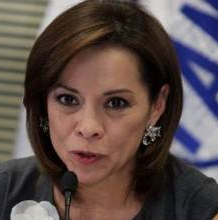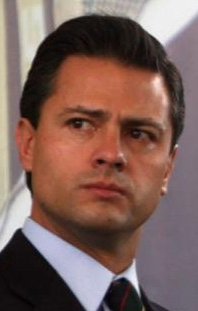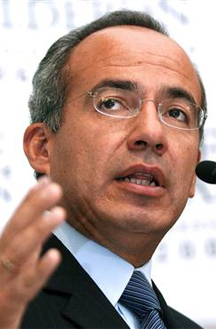MEXICO CITY, (Reuters) – The unity that helped Mexico’s ruling conservatives end seven decades of one-party rule is cracking under the weight of infighting, scandal and defections that threaten their hopes of retaining the presidency in July.

Eleven years after President Felipe Calderon’s National Action Party, or PAN, first took power, the party is battling accusations it has succumbed to corruption and vote-rigging, and betrayed its founding principles.
Some prominent figures have turned their back on the party because they feel it has stooped to the cronyism and fraud it once fought to overcome, undermining the campaign of PAN presidential candidate Josefina Vazquez Mota.
The PAN’s leadership remains united but the divisions below have put it on the defensive, and Vazquez Mota faces an uphill battle against presidential front-runner Enrique Pena Nieto of the opposition Institutional Revolutionary Party, or PRI. She trails him in polls by between 7 and 18 percentage points.
The PRI had 71 years of often autocratic and corrupt rule until Calderon’s predecessor Vicente Fox won a 2000 election. But the PAN’s own record has been tarnished in recent months.
“Instead of everything it touches turning to gold, it corrupts everything it touches,” Manuel Clouthier Jr., son of former PAN stalwart and presidential candidate Manuel Clouthier, said of the government as he quit the PAN last month.
The younger Clouthier launched his own presidential bid and is one of the current and former PAN faithful seething about how the party selected its candidates last month for federal and local elections also being held on July 1.
They allege that voter fraud, buying favors and even plots with arch rival, the PRI, marred 47 – or nearly one in six – of the internal elections in half the states of the republic.

Still trailing Pena Nieto by a big distance, Vazquez Mota needs to be gaining support, not putting down in-house strife, said Roy Campos at Consulta Mitofsky polling firm.
Supporters worry about the damage the rows have done.
“Josefina needs to clean things up, she needs to take a stand,” said department store salesman Arturo Romero, 26.
Moral authority
Vazquez Mota, the first woman presidential candidate to be chosen by one of Mexico’s three main parties, is urging her party to end the disputes.
“It’s time for unity. It’s time to resolve the internal differences with total commitment to democracy,” she told PAN supporters inside a soccer stadium in Mexico City on Sunday.
But her party also mishandled the speech. Supporters who had to wait in sweltering heat for hours began dispersing while Vazquez Mota was still talking, presenting Mexicans with the spectacle of her addressing half-empty stands.
The PAN is already struggling to cope with widespread disenchantment about the 50,000 lives claimed by violence across Mexico since Calderon sent in the army to root out drug gangs after he took office in December 2006.
Failure to cut poverty and oversee strong economic growth in the past decade has also hurt the party, and the electoral disputes have undermined an anti-corruption stand that was central to its identity in the 60 years it took to win power.

“Instead of making a change, they’ve been making themselves part of the system,” said Jorge Kalionchiz, head of employers’ association COPARMEX in the northern city of Monclova.
Allegations of vote-rigging in the PAN’s ballots have a strong echo of the accusations long thrown at the PRI.
Javier Corral, a PAN lawmaker who lost a primary race for a Senate seat in the northern state of Chihuahua, accused his two rivals of ferrying in busloads of bribed voters to beat him.
Corral, who said one of the men had conspired with a local PRI mayor, has challenged the result with PAN electoral authorities. He has yet to receive an answer, his office said.
Several PAN grandees signed a letter in protest at the selection process in Chihuahua, including the party’s first ever state governor Ernesto Ruffo and elder statesman Luis Alvarez.
Anger at the party’s failings has been strongest in northern Mexico, where it draws much of its traditional support.
The industrial city of Monterrey — a PAN stronghold — has been at the eye of the storm since a scandal enveloped the office of mayor Fernando Larrazabal at the end of August.
After an arson attack by a drug gang on a Monterrey casino killed 52 people, a video emerged of Larrazabal’s brother receiving a large sum of money in a local gambling house, which have been suspected of involvement with protection rackets.
Prosecutors arrested his brother, who said the payment was for cheese and other goods, and the PAN urged Larrazabal to stand down pending an investigation. He refused, and last month was put onto a list of candidates for seats in the lower house of Congress awarded via proportional representation.
That sparked an outcry from some PAN leaders in Larrazabal’s home state Nuevo Leon. Rogelio Sada, a respected 50-year PAN veteran, quit in protest, saying the party had been infiltrated by people “who put their own interests ahead of the party.”
Opportunists
Disgruntled activists like Sada complain that the PAN has sold its soul to cling to office, opening its doors to political opportunists with scant regard for the party’s principles.
The PAN holds or shares power in nine of Mexico’s 31 states, but four of them are governed by men who joined the PAN ticket from another party – in most cases the PRI.




